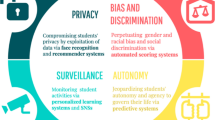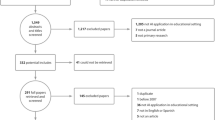Abstract
Along this decade, advances from Cognitive and Computing Sciences disturbed the college campus, namely, via the availability of online courses (MOOCs) and tools, and also the secondary schools with e-learning environments. The technological impacts helped to democratize traditional university education and brought, to everywhere in the world, the teaching of wonderful professors through Internet (YouTube). Yet, the lectures are still alive, and the old fashion pedagogy seems in good health, most of the students do not participate fully in the process of learning. What is missing is a profound shake-up of mentalities, new initiatives to accelerate learning research and the discovery of the resilience of the whole process. Artificial intelligence and information and communication technologies (ICTs) in general are sound proposals to open alleys till a happy solution, and in this study, we try to show some ideas about the disruption of the traditional classroom scenario due to the availability of innovative online resources and computers (tablets, smartphones, and laptops).

Similar content being viewed by others
References
Acce, T.W., et al.: Academic boredom in under- and over-challenging situations. Contemp. Educ. Psychol. 35(1), 17–27 (2011)
Bonwell, C.C., Eison, J.A.: Active Learning: Creating Excitement in the Classroom, ASHE-ERIC Higher Education Rep. No 1, The George Washington University (1991)
Coelho, H.: Living with Digital Worlds: A Personal View of Artificial Intelligence, BioISI Working Report, Lisbon University (2016)
Fernández-Caballero, A., López-Jaquero, V., Montero, F., González, P.: Adaptive interaction multi-agent systems in e-learning/e-teaching on the web. In: Cueva Lovelle, J.M., et al. (eds.) ICWE-2003, LNCS 2722, pp. 144–153. Springer (2003)
Fletcher, J., Najarro, A., Yelland, H. (eds.): Fostering Habits of Mind in Today’s Students: A New Approach to Developmental Education. Stylus Publishing (2015)
Freeman, S., Eddy, S.L., McDonough, M., Smith, M.K., Okoroafor, N., Jordt, H., Wenderoth, M.P.: Active learning increases student performance in science, engineering, and mathematics. Proc. Natl. Acad. Sci. 111(23), 8410–8415 (2014). doi:10.1073/pnas.1319030111
Graff, H.J.: Undisciplining Knowledge: Interdisciplinarity in the Twentieth Century. John Hopkins University Press, Baltimore (2015)
Hindi, R.: How AI will Make Technology Disappear. TEDxÉcole Polytechnique talk, YouTube (2015)
Hindi, R.: Phone Unlocked. Wired UK 03, p. 28 (2016)
Koch, F.L., Rao, C.: Towards massively personal education through performance evaluation. Int. J. Inf. Educ. 4(4), 297–301 (2014). ISSN 2010-3689
Koster, A., Primo, T., Koch, F., Oliveira, A., Chung, H.: Towards an Educator-Centred Digital Teaching Platform: The Ground Conditions for a Data-Driven Approach. In: IEEE 15th International Conference on Advanced Learning Technologies (ICALT), Hualien. IEEE 15th International Conference on Advanced Learning Technologies, p. 74 (2015)
Leonard, G.: Mastery: The Key to Success and Long-Term Fulfillment. Penguin Publishing Group, London (1992)
Mahdi, H., Attia, S.S.: MASCE: A multi-agent system for collaborative e-learning. In: Proceedings of IEEE/ACS International Conference on Computer Systems and Applications, pp. 925–926. IEEE press (2008)
Onah, D.F.O., Sinclair, J., Boyatt, R.: Dropout rates of massive open online courses: behavioural patterns (2014)
Paul, R., Elder, L.: Critical Thinking: Tools for Taking Charge of your Learning and your Life. Prentice-Hall, Upper Saddle River (2005)
Science Daily.: Artificial intelligence course creates AI teaching assistant. https://www.sciencedaily.com/releases/2016/05/160509101930.htm (2016). Accessed 04 Aug 2016
Settles, B.: Active Learning. Morgan & Claypool Publishers, San Rafael (2012)
Swenson, P., Taylor, N.A.: Online Teaching in the Digital Age. SAGE Publications, Inc, London (2012)
Turgay, S.: A multi-agent system approach for distance learning architecture. Turk. Online J. Educ. Technol. 4(4), 21–26 (2005)
Viccari, R.M., Ovalle, D.A., Jiménez, J.A.: ALLEGRO: teaching/learning multi-agent environment using instructional planning and case-based reasoning. CLEI Electron. J. 10(1), 1–20 (2007)
Vicente, A., Galvão-Ferreira, P., Tecuapetia, F., Costa, R.: Direct and indirect dorsolateral striatum pathways reinforce different action strategies. Curr. Biol. 26(7), R267–R269 (2016)
Walvoord, B., Anderson, V.J.: Effective Grading: A Tool for Learning and Assessment. Jossey-Bass, San Francisco (1998)
Acknowledgments
I wish to express all my gratitude to the support supplied by a Grant to BioISI Group MAS, Center Reference: UID/MULTI/04046/2013), from FCT/MCTES/PIDDAC, Portugal.
Author information
Authors and Affiliations
Corresponding author
Rights and permissions
About this article
Cite this article
Coelho, H., Primo, T.T. Exploratory apprenticeship in the digital age with AI tools. Prog Artif Intell 6, 17–25 (2017). https://doi.org/10.1007/s13748-016-0100-6
Received:
Accepted:
Published:
Issue Date:
DOI: https://doi.org/10.1007/s13748-016-0100-6




